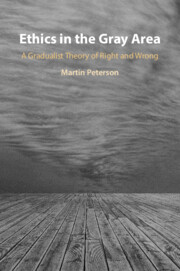Book contents
- Ethics in the Gray Area
- Ethics in the Gray Area
- Copyright page
- Contents
- Figures
- Tables
- Preface
- Introduction
- Chapter 1 Meaning Tracks Use
- Chapter 2 Conflicting Reasons
- Chapter 3 Conflicting Sources of Normativity
- Chapter 4 The Binary Theory
- Chapter 5 Moral Indeterminacy and Vagueness
- Chapter 6 Normative Ethics for Gradualists
- Chapter 7 Rational Choice for Gradualists
- Chapter 8 Indeterminate and Vague Laws
- Chapter 9 Depolarization
- Conclusions
- References
- Index
Chapter 4 - The Binary Theory
Published online by Cambridge University Press: 11 May 2023
- Ethics in the Gray Area
- Ethics in the Gray Area
- Copyright page
- Contents
- Figures
- Tables
- Preface
- Introduction
- Chapter 1 Meaning Tracks Use
- Chapter 2 Conflicting Reasons
- Chapter 3 Conflicting Sources of Normativity
- Chapter 4 The Binary Theory
- Chapter 5 Moral Indeterminacy and Vagueness
- Chapter 6 Normative Ethics for Gradualists
- Chapter 7 Rational Choice for Gradualists
- Chapter 8 Indeterminate and Vague Laws
- Chapter 9 Depolarization
- Conclusions
- References
- Index
Summary
Advocates of the binary theory believe that in every choice situation every act is either right or wrong (if it has any deontic property at all) but never a bit of both. This chapter reconstructs and responds to six arguments for the binary theory. According to the first, it is impossible to make sense of what it would mean to say that some acts are a bit right and a bit wrong. The second argument seeks to identify an analytic connection between, for instance, calling something right and implying that a person ought to be praised. The point of the third argument is that for gradualists it seems difficult to give a plausible account of how a rational and morally conscientious agent would choose. The fourth argument holds that the binary theory provides a more convincing account of moral conflicts than the gradualist account outlined in Chapter 2. The fifth argument is a generalization of Aristotle’s claim there is no margin of error in ethics. Finally, the sixth argument seeks to show that it is possible to articulate the intuition that RIGHT and WRONG permit of degrees in a manner that is compatible with the binary theory.
Keywords
Information
- Type
- Chapter
- Information
- Ethics in the Gray AreaA Gradualist Theory of Right and Wrong, pp. 80 - 100Publisher: Cambridge University PressPrint publication year: 2023
